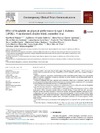Identificador persistente para citar o vincular este elemento:
https://accedacris.ulpgc.es/jspui/handle/10553/21039
| Título: | Effect of liraglutide on physical performance in type 2 diabetes (LIPER2): A randomised, double-blind, controlled trial | Autores/as: | Wägner, Ana María Miranda Calderín, Guillermo Ugarte-Lopetegui, Miren Arantza Marrero-Santiago, Héctor Suárez-Castellano, Laura Alberiche Ruano, Maria Del Pino Castillo-García, Nuria López-Madrazo, María José Alemán, Carolina Martínez-Mancebo, Carla López Ríos, Laura Díez del Pino, Alicia Novoa Mogollón, Francisco |
Clasificación UNESCO: | 320502 Endocrinología | Palabras clave: | Randomised controlled trial Ergometry Maximal oxygen consumption Ventricular function Diabetes, et al. |
Fecha de publicación: | 2016 | Publicación seriada: | Contemporary Clinical Trials Communications | Resumen: | Preclinical studies and small clinical trials suggest that glucagon-like peptide 1 (GLP1) may have a positive effect on ventricular function. Liraglutide is a GLP1-analogue used in the treatment of type 2 diabetes. LIPER2 is a phase IV, randomised, double-blind, placebo-controlled, parallel-design trial, assessing the effect of 6 months’ liraglutide 1.8 mg/d on measures of cardiac function and physical performance in patients with type 2 diabetes. A total of 30 patients with type 2 diabetes will be included, if their HbA1c is between 7 and 10% while on oral agents (including metformin if tolerated and not contraindicated), a maximum of 2 intermediate or long-acting insulin injections per day or a combination of both. After their baseline examinations, patients are randomised to receive a daily subcutaneous liraglutide or placebo injection (titrated to 1.8 mg/d if tolerated) for 6 months. The primary end-point is the maximal oxygen consumption during cycle ergometry at the end of the study period. Other end-points include distance covered during a 6-min walk test, left ventricular ejection fraction and other measures of ventricular systolic and diastolic functions assessed by echocardiography, heart rate, blood pressure, pro-brain natriuretic peptide, C-reactive protein, HbA1c, lipids, apolipoprotein B, body weight and waist girth. Safety end-points include adverse event reporting, blood count, kidney and liver function, amylase, lipase, electrolytes, calcitonin, CA19.9 and pregnancy test for fertile women. At the time of this report, recruitment is still ongoing. Results are expected to be reported in December 2016. | URI: | https://accedacris.ulpgc.es/handle/10553/21039 | ISSN: | 2451-8654 | DOI: | 10.1016/j.conctc.2016.06.007 | Fuente: | Contemporary Clinical Trials Communications[ISSN 2451-8654],v. 4, p. 46-51, (Diciembre 2016) | Derechos: | by-nc-nd |
| Colección: | Artículos |
Citas SCOPUSTM
3
actualizado el 08-jun-2025
Citas de WEB OF SCIENCETM
Citations
4
actualizado el 22-feb-2026
Visitas
87
actualizado el 30-dic-2023
Descargas
146
actualizado el 30-dic-2023
Google ScholarTM
Verifica
Altmetric
Comparte
Exporta metadatos
Los elementos en ULPGC accedaCRIS están protegidos por derechos de autor con todos los derechos reservados, a menos que se indique lo contrario.
